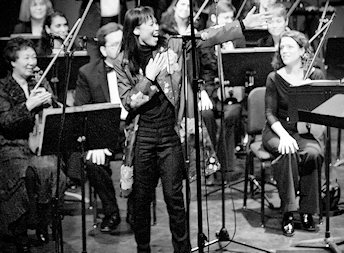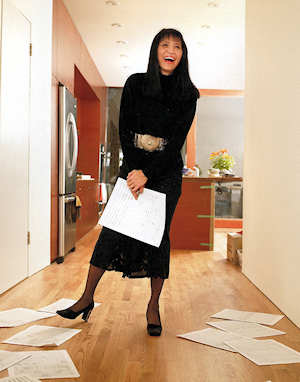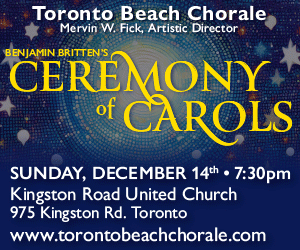Composer Alexina Louie offers a warm greeting at the door of her home, in Toronto’s High Park neighbourhood. Repeatedly, she apologizes for the not-quite-finished renovations to the house she shares with her partner, conductor Alex Pauk, and their children. The renovation has been going on for several years – and at one point even threatened her compositional activity. (More on that later.)
Soon we’re sitting around the kitchen table, looking at the score to her newest piece, Pursuit, for orchestra and string quartet. The work was composed for the Toronto Symphony Orchestra and the Tokyo String Quartet, and will be premiered on March 7, as part of the TSO’s New Creations Festival. Such an unusual combination of instrumental forces, was, Louie admits, a challenge.
“I spent a lot of time thinking about this piece,” she observes, turning the pages of the big score, “before I started to write the notes. At the outset, I had a meeting with the Tokyo Quartet – I heard them play, and we met the next day. I said I’d like to write a piece that won’t have to be amplified. But I’m not sure, even at this point, if the quartet will need microphones. Roy Thomson is a big hall.”
She continues: “Also, I didn’t want to relegate the orchestra to the occasional chord, or to create a separation between the orchestra and the quartet. I had to come up with creative solutions.”
As composers go, Louie can be remarkably candid when talking about her compositional processes. In February, when the Esprit Orchestra gave the Toronto premiere of her Infinite Sky With Birds, she told the audience, just before the performance, that “a sense of panic” often sets in when she’s asked to write a new piece.
“I used the word ‘panic,’” she explains with a smile, “but it’s not that I get blocked. I have a great respect for the activity of creating music. Trying to create a work of art that expresses something that I feel, and is important enough to take up people’s time, is a big responsibility. And I don’t want to let myself down. I don’t want to write a piece that’s less fulfilling – for myself, for the performer, and also for the listener.”
Louie is a rarity in Canada’s musical culture: a freelance composer who derives almost all of her income from composing. She’s been plying her trade for more than three decades, and her catalogue of works at the Canadian Music Centre contains 47 compositions. And she has about a dozen more compositions that haven’t yet found their way to the CMC library, as yet.
She works constantly. “In the last year,” she recalls, “I had something to do with my music every single day. I was working on a piece for the Montreal Piano Competition, and pieces for the Montreal and Toronto orchestras, and also a made-for-television opera. They were all cooking at the same time. They all presented different challenges, and required completely different solutions.”
So how does she do it? According to Louie, the creativity is a “two way street: images come to you, but your own creative urges drive the process as well. Some pieces are inspired by a form or a structure. Sometimes it’s just a feeling.”
When she begins to commit her ideas to paper, she likes doing things the old-fashioned way, working with a pencil (and eraser), rather than a music-notation program on a computer. “There’s a grey area where creativity develops. And if you enter your ideas into a computer too soon, they become concrete.” Louie also likes working at the piano. “I can plan a piece without the piano – and I think about different sound-combinations away from the piano. But when it comes to putting notes on the page, I try to play everything.”
Two years ago, Louie’s use of the piano as a compositional tool was threatened by her personal circumstances. The ongoing renovation of her home had reached a point where the family had to vacate the premises, putting many of their possessions – including Louie’s piano – into storage. “If you’re a freelance composer,” she points out, “you don’t have the luxury of having a studio where you teach.”
For part of the time, the family rented a house that came with a piano. But the renovation work wasn’t finished when they had to leave their rented home, and so they moved from one temporary house-sitting arrangement to another. This left Louie without an instrument to compose on.
“If push comes to shove,” she says, “I can work under almost any circumstances. That said, I called people I knew, begging for a piano studio. Finally, a friend came up with a solution: he and a friend who was an artist worked in a commercial building. It turned out that the landlord had a space in the building with a piano that I could use. I relied on the kindness of strangers – and friends!”
Also important to Louie’s creative process is contact with the musicians she’s writing for. “I try to write a piece that fits the commission. Hardly ever do I write a piece that’s totally unconnected with a performer’s talent. For an orchestral piece, I might listen to recordings. I might talk to administrators and ask which performers are of solo calibre. But sometimes I just work with an idea I have about the sound of the orchestra itself.”

Louie’s works have been performed by just about every orchestra in Canada, and she’s built strong relationships with the TSO, the MSO and Ottawa’s National Arts Centre Orchestra. She’s equally respected as composer of solo piano, chamber and choral music. As well, a slew of awards and honours have come her way: “Composer of the Year” in 1986, the Jules Leger Prize for chamber music in 1999, the Order of Ontario in 2001, and SOCAN awards as most performed Canadian composer in 1990, 1992 and 2003.
It would be nice to say that she’s led a creative life undisturbed by setbacks or obstacles – but that wouldn’t quite be true. In 1996, the Canadian Opera Company commissioned a full-length opera from her and playwright David Henry Hwang. However, the opera, entitled The Scarlet Princess, soon became bogged down in artistic differences between Louie and then-General Director Richard Bradshaw. Although the work was presented in one concert performance in 2002, it’s never received a fully staged production from the COC, or any other company.
“The Scarlet Princess was a huge labour – it took six years,” says Louie, clearly frustrated that the opera has never been seen as she intended it. Yet she remains optimistic about the work’s future. “I feel still positive about The Scarlet Princess as an opera. I had a very successful concert performance of it, and I still have people asking me when it’s going to be staged, because they want to see it. There are no immediate prospects, but I’m always working on it. I haven’t met with Alexander Neef at the COC, but I hope to.”
Louie has had some performances outside Canada, too. The orchestras of San Francisco, Indianapolis and St. Louis have played her music. Her Love Songs for a Small Planet has been sung by a choir in Sweden. Yet, she’s aware of the “glass ceiling” that often limits this country’s composers to a “world-famous in Canada” status.
“It’s a challenge, says Louie, “because I don’t have a publisher who’s working on my behalf. You really have to have a champion for your work, because a performing organization doesn’t take you seriously if you don’t. I’ve approached a few publishers, and they said that my music was good, but they didn’t know what to do with it.” (That’s polite code for “We don’t think anyone outside Canada is interested in Canadian music.”)
Buoyed by strong support at home, Louie continues her artistic journey. “I don’t think of myself as writing quickly – but when you think of the amount of music that I’ve written, you might say that I do. No piece is ever written in a week, or a month. I guess what I’m saying is that I may not always write quickly, but I do write relentlessly.”



